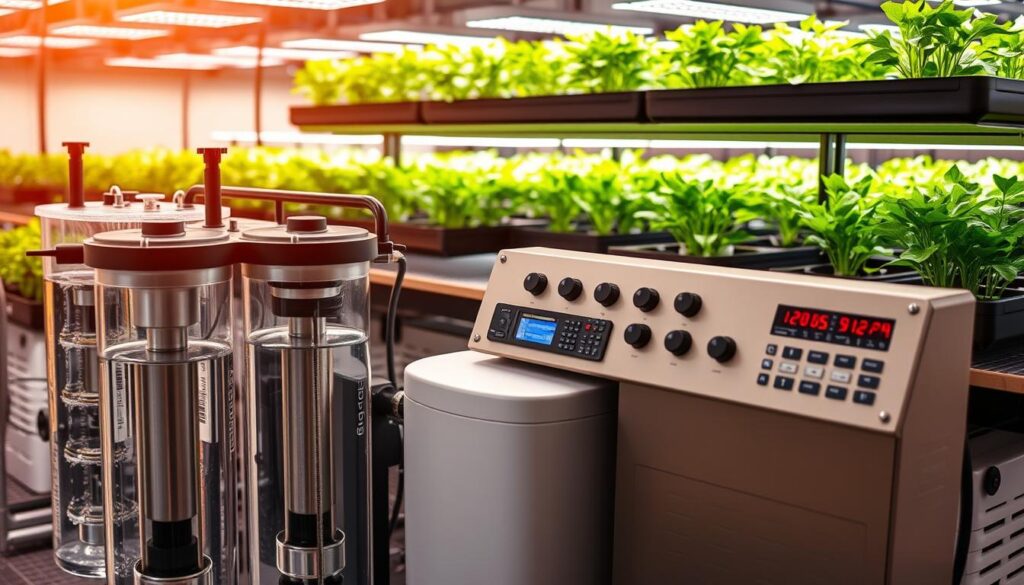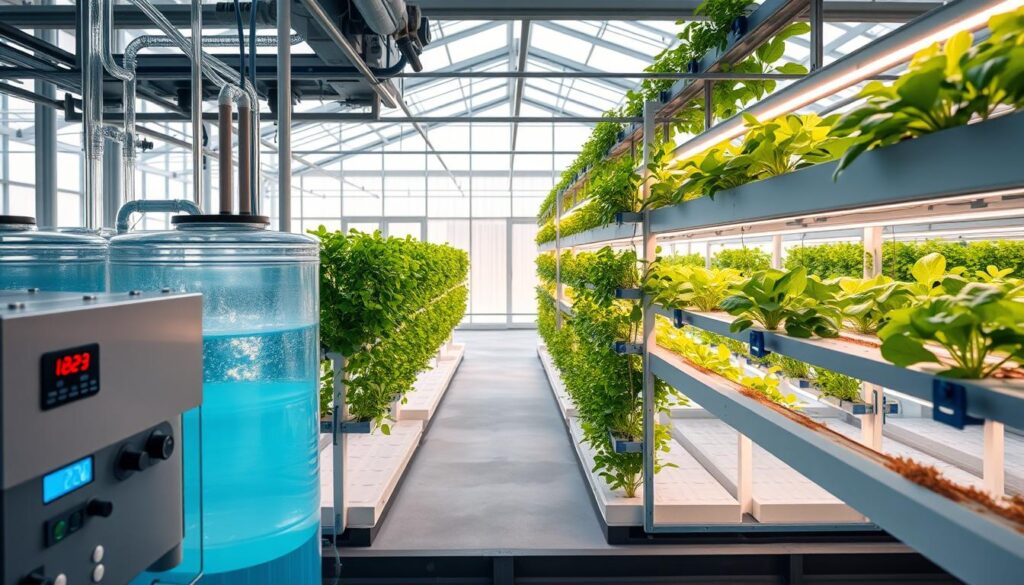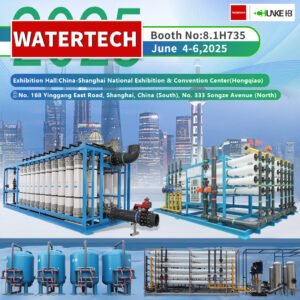Today, we explain Hydroponic Farming Water Treatment. We are Chunke Water Treatment, a top water treatment system maker from Guangzhou, China. We focus on creating systems for hydroponic farming. This method needs precise water treatment for the best crop growth1.
Hydroponic farming grows plants in a nutrient-rich solution, not soil. It’s popular for saving water, using 98% less than traditional farming1. It also offers higher yields, making water treatment key.
Good water quality is vital for hydroponic farming success. Bad water can harm crops, make them sick, and increase costs. We offer reliable water treatment solutions to keep water quality high. This allows for crops all year and steady income1.
Key Takeaways
- Hydroponic farming needs precise water treatment for the best crop growth.
- Hydroponic systems use 98% less water than traditional farming methods due to recirculation1.
- Water treatment for hydroponic farming is crucial for the success of hydroponic farming.
- Hydroponic farming allows for year-round crop production and consistent revenue streams1.
- Chunke Water Treatment provides reliable hydroponic farming water treatment solutions.
- Hydroponic water treatment is essential for the success of hydroponic farming.
- Using hydroponics, only 70 liters (18 U.S. gal) of water are required to grow the same amount of tomatoes2.
The Evolution of Water Treatment in Modern Hydroponic Farming
Managing water in hydroponic systems is key for healthy crops and high yields. Hydroponics can cut water use by up to 90% compared to traditional farming3. This method also lets us grow crops all year, no matter the weather outside. Hydroponics need much less water, land, and energy than traditional farming4.
Filtration and sterilization of nutrient solutions are vital in hydroponics. Chlorine Dioxide (ClO2) is a strong disinfectant that fights off many pathogens5. It helps keep water clean and prevents disease. Hydroponics can grow up to 20 times more lettuce per acre than soil farming3. Using ozonated water can kill up to 99% of certain bacteria4.
Here are some benefits of hydroponic system water management:
Essential Components of Hydroponic Farming Water Treatment
Keeping water quality right is key for healthy crops in hydroponics. Good water treatment systems manage water quality well. This ensures it’s perfect for plant growth6. Hydroponics use 17 nutrients for plants to grow well, including big and small nutrients.
Advanced Reverse Osmosis Solutions for Hydroponic Systems
Exploring hydroponic farming, we see the need for water treatment. Reverse osmosis is key, removing many contaminants from water. This makes the water perfect for growing crops. Chunke offers top-notch reverse osmosis solutions with the newest membrane tech. This means better efficiency and lower costs9.
Our systems aim to save water, cutting down on waste. They also use less energy, keeping performance high. This way, hydroponic farmers can keep their nutrient solutions clean. This leads to healthy plant growth10.
Our advanced reverse osmosis solutions offer many benefits:
By choosing our solutions, farmers give their crops the best start. This leads to higher yields and better crop quality. With today’s tech, reverse osmosis is now affordable for growers9.
Ultrafiltration Systems: The Future of Hydroponic Water Purification
Hydroponic farming is changing fast, thanks to ultrafiltration systems. These systems are great at removing dirt and harmful stuff from water12. This is super important for hydroponic farming because clean water means healthier crops and better yields. Using an ultrafiltration system helps farmers give their crops the cleanest water possible, leading to better growth and more food.
More and more farmers are using ultrafiltration systems in their hydroponic farms. They see how it helps. Water waste is going up, by 24% by 2030 and 51% by 205012. So, having good water treatment systems is key. Ultrafiltration systems help farmers make their crops better while also being kinder to the planet.
Some big pluses of using an ultrafiltration system for hydroponic gardens are:
- Water quality gets better
- Crops grow more
- The planet gets a break
- It saves money
By getting an ultrafiltration system, hydroponic farmers can make sure their crops get the cleanest water. This leads to healthier plants and more food12.
Innovative Pre-treatment Solutions for Hydroponic Applications
Exploring hydroponic farming, we see the key role of pre-treatment in water management. It removes big particles and contaminants, preventing system damage. Chunke offers advanced pre-treatment for hydroponics, including sediment filters and chemical treatments14.
Our solutions make water quality better, cutting down crop disease risks and boosting system efficiency. They work well with hydroponic systems, helping farmers use water wisely and cut waste. For example, hydroponics cuts down water use by 85–90%14, and it can produce 1000 times more than traditional farming14.
Our pre-treatment solutions offer many benefits:
- Improved water quality
- Reduced risk of crop disease
- Increased system efficiency
- Optimized water usage
Using our pre-treatment, hydroponic farmers can lower their environmental impact. They can also increase crop yields and quality. With the hydroponics market expected to hit $25.1 billion by 202714, this industry is set for big growth. It’s crucial to focus on water treatment and management for hydroponics’ future15.
Electrodeionization Technology in Hydroponic Farming
Electrodeionization (EDI) technology is a top choice for water treatment in hydroponic farming. It’s efficient and doesn’t use chemicals, making it safe for crops16. This method ensures the water quality is perfect for plant growth, which is key for healthy crops.
Water quality is crucial in hydroponic farming. Bad water can harm plant growth and lead to disease17. EDI systems can make water very pure, up to 16.0 MΩ-cm, which is great for hydroponics16. They also handle contaminants well and don’t need chemicals to work, which is better for the environment16.

Water Softening Systems for Enhanced Nutrient Delivery
We know how vital water quality is in hydroponic farming, for nutrient delivery. Water softening systems are key in removing minerals that cause scaling and lessen nutrient solution effectiveness19. They help ensure plants get the nutrients they need for growth. This is crucial in places like Saudi Arabia, where water is scarce and quality is a big issue.
Hydroponic water treatment solutions, like reverse osmosis, are vital for keeping water quality right. They can take out up to 99% of contaminants, including heavy metals and chlorine, from hydroponic water20. Good water treatment stops waterborne pathogens and cuts down on crop diseases. It also boosts yields and quality, making it a smart choice for farmers.
Some main perks of water softening systems in hydroponics are:
- Improved nutrient absorption
- Reduced scaling and equipment damage
- Increased crop yields and quality
- Enhanced disease resistance
Keeping water softening systems in good shape is key for steady water flow and nutrient delivery to plants20. By using high-purity water systems and keeping them up, farmers can better their operations and profits. As the hydroponics market worldwide grows, so will the need for good water treatment solutions20.
Maximizing ROI Through Efficient Water Treatment
Efficient water treatment is key for a good ROI in hydroponic farming. It affects crop yields, water use, and the farm’s sustainability21. By using the right water treatment systems, farmers can cut costs, save water, and grow healthier crops. This leads to a better return on investment.
The benefits of efficient water treatment in hydroponic farming can be summarized in the following table:
In conclusion, efficient water treatment is vital for a high ROI in hydroponic farming. By investing in the right systems, farmers can lower costs, save water, and grow better crops. This all adds up to a better return on investment21.
Smart Monitoring and Control Systems for Hydroponic Water Management
Efficient water management is key in hydroponic farming. That’s why we focus on smart monitoring and control systems. These systems help farmers analyze data in real-time. This lets them quickly fix problems, cutting down on downtime and boosting efficiency24.
By linking these systems with water treatment, farmers can use water better and cut waste. This is crucial for keeping their systems running smoothly.
Smart monitoring and control systems offer many benefits. They let farmers check and manage their systems from anywhere. They also provide real-time data on water quality and system performance25.
This means farmers can act fast if something goes wrong. It helps keep their systems running well and efficiently.
Some key advantages of these systems include:
- Improved water efficiency
- Less energy use
- Bigger crop yields
- Better nutrient delivery
By using these systems, farmers can manage their water better. This leads to better crops and less harm to the environment24.
As hydroponic farming grows, managing water and using good water treatment solutions becomes even more important. Smart monitoring and control systems help farmers use water wisely. They also cut down on waste and support green farming practices25.
Environmental Impact and Sustainability Benefits
Hydroponic farming water treatment has many benefits for the environment. It uses less water and takes up less land26. By using water treatment for hydroponic farming, farmers can reduce their carbon footprint. This makes farming more sustainable.
This farming method can make crops grow up to 50% faster than traditional farming26.
One big plus of hydroponic farming is saving water. It needs only 10% of the water used in regular farming26. This saves water and cuts down on pollution and waste from farming. Using hydroponic farming water treatment also means using less chemicals and pesticides.
Hydroponic farming offers many benefits and is very sustainable. As the world’s population grows, we need to farm more efficiently and gently on the environment. By using hydroponic farming water treatment and other green farming practices, we can ensure food for everyone. This way, we also reduce the harm farming does to our planet27.
Conclusion: Advancing Hydroponic Agriculture Through Superior Water Treatment
Hydroponic water treatment and hydroponic system water management are key to successful hydroponic farming28. At Chunke, we focus on providing top-notch solutions for hydroponic farmers. We help them use water wisely and grow more crops. Our advanced technologies like reverse osmosis and ultrafiltration make sure plants get the best water29.
The need for food and sustainable farming is rising fast29. Chunke’s water treatment solutions are crucial for hydroponic farming’s future. By choosing us, you’re investing in your farm’s future and helping the industry grow. Let’s work together to make a greener, more efficient future for everyone28.
FAQ
What is the importance of water treatment in hydroponic farming?
Water quality is key in hydroponic farming. It affects crop health and growth. Good water treatment systems are needed to keep water quality right for plants.
How does Chunke's expertise address the challenges in hydroponic water management?
Chunke knows a lot about water treatment for hydroponics. They help with water management and how water quality affects crops. They also know about hydroponics in Saudi Arabia.
What are the key components of Chunke's hydroponic farming water treatment solutions?
Chunke’s systems control water quality well. They use advanced tech like reverse osmosis and ultrafiltration. This ensures plants grow well in hydroponics.
How do Chunke's reverse osmosis solutions enhance hydroponic systems?
Chunke’s reverse osmosis uses the latest tech. It saves water and energy. This means better water for plants and lower costs for farmers.
What are the benefits of Chunke's ultrafiltration systems for hydroponic water purification?
Chunke’s ultrafiltration removes dirt and bad stuff from water. This makes water very clean. Clean water is vital for healthy crops in hydroponics.
How do Chunke's pre-treatment solutions support hydroponic water management?
Chunke’s pre-treatment gets water ready for more treatment. It removes big particles and bad stuff. This helps the hydroponic system work better.
What is the role of electrodeionization technology in Chunke's hydroponic water treatment solutions?
Chunke’s electrodeionization purifies water without chemicals. It uses electricity to remove contaminants. This is good for plants and the environment.
How do Chunke's water softening systems enhance nutrient delivery in hydroponic farming?
Chunke’s water softening removes minerals. This helps plants absorb nutrients better. This leads to healthier and more productive crops.
How can efficient water treatment maximize the ROI in hydroponic farming?
Good water treatment cuts costs and saves water. It also makes crops healthier. Chunke’s systems are made to save water and money.
What are the features of Chunke's smart monitoring and control systems for hydroponic water management?
Chunke’s systems give real-time data and let you monitor from afar. They also predict when maintenance is needed. This keeps systems running smoothly.
How do Chunke's water treatment solutions support the environmental sustainability of hydroponic farming?
Chunke’s solutions reduce waste and chemical use. This lowers the environmental impact. It makes hydroponics more sustainable.


